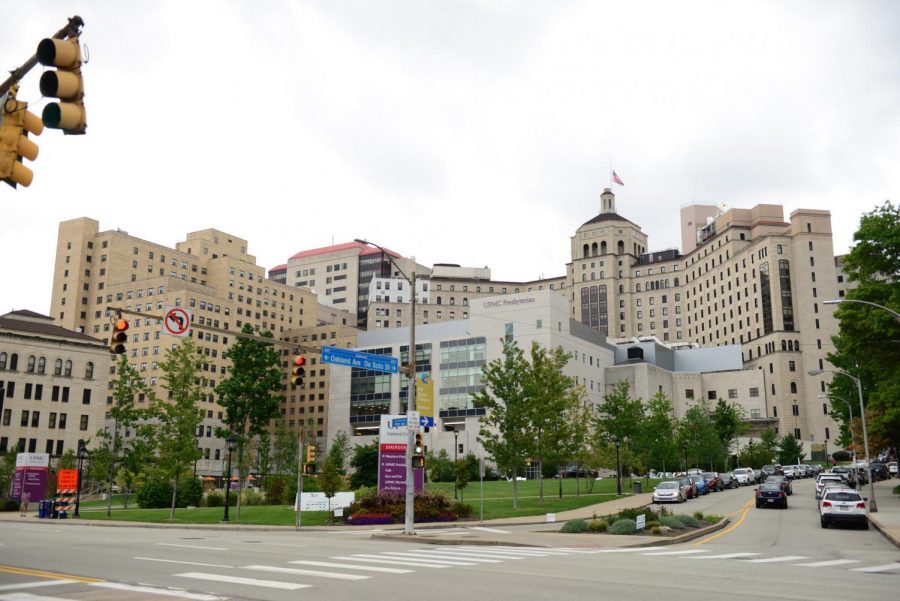MACRO immerses students in clinical research at UPMC
UPMC Presbyterian Hospital complex on Fifth Avenue.
January 19, 2023
Tom Su, a senior emergency medicine major, came to Pitt with the intention to enter the emergency medicine program. He applied to the student employment program Multidisciplinary Acute Care Research Organization during his first year because he thought it sounded like a “pretty interesting opportunity.”
“I was an EMT in high school and I came to Pitt solely for the reason of matriculating into the emergency medicine paramedic program, and I thought the acute care research would be a good complement to the actual clinical practice,” Su said.
Through MACRO, student research associates can enroll patients into multiple research studies at both UPMC Presbyterian and Mercy emergency departments.
Sierra Lomax, communications specialist for UPMC Media Relations, said students represent about a quarter of the program. In the program, students participate in data collection from a patient’s medical chart, communicating with principal investigators and bedside physicians and updating research coordinators on the day-to-day operations of specific clinical trials.
According to Dr. David Huang, the medical director of MACRO and a professor in the School of Medicine, the goal of these studies is to test new therapies and discover new biological mechanistic insight for acute conditions such as trauma and sepsis.
Tom Byers, assistant director of student employment operations for MACRO, said student research associates are responsible for correctly identifying eligible patients and facilitating their enrollment into clinical research on a “24/7 basis.”
Identifying eligible patients includes coordinating sample collection, such as blood, urine and biospecimens, with emergency department and ICU nurses in the UPMC hospitals. Huang said, depending upon the trial, those samples are then processed in UPMC laboratories with oversight by their lab staff.
Su said the MACRO program trains students to become well rounded in both academia and clinical research.
According to Su, his primary responsibility in the program is to screen patients into the emergency department for eligibility in certain studies they conduct. He said this includes looking through a patient’s medical records to identify whether they meet the inclusion or exclusion criteria for clinical studies.
“The program prepares you very well for any sort of research oriented career or any other clinical role because, as research associates, we’re immersed in the environment,” Su said.
Aya Dakroub, a senior chemistry major, found the MACRO program while looking for paid research opportunities during her junior year. After years of working for MACRO, her responsibilities have expanded to include training new hires for their first few shifts and working on-call to answer questions and help with processing.
“Being able to understand how to conduct research [is beneficial], especially clinical research, because it’s with patients rather than other research that might be with mice or something like that,” Dakroub said. “You’re really in the area where physicians are interacting with people.
Dakroub said the person-to-person research she does in the MACRO program benefits her future because she has a better understanding of how to pursue knowledge in medicine and how to navigate difficult conversations with individuals in the emergency department.
“You learn to get communication down with people in the emergency department,” Dakroub said. “A lot of times this is a scary or traumatic moment for a lot of people and you’re talking to them about research, so being able to navigate those conversations is important.”
According to Byers, acute care medicine in the emergency department and ICU settings requires the ability to communicate effectively, adjust priorities quickly and come to decisions that are both safe and medically sound.
“The goal of the program is that students leave it in pursuit of their passions with more confidence, strong connections and a desire to implement their skills in real practice,” Byers said.
According to Huang, the work of the students is especially beneficial to science because their work facilitates the execution of trials that will generate new knowledge to help clinicians take better care of their patients and better understand how the body responds to injury and illness.
“This new knowledge will ultimately benefit the hospital and all of society,” Huang said.
Su said the program helped him achieve the goals he set in undergrad and, because of that, he feels well prepared for the work he intends to do in the future.
“The program prepares you very well for any sort of research-oriented career or any other clinical role, because [as] research associates we’re immersed in the environment,“ Su said.








